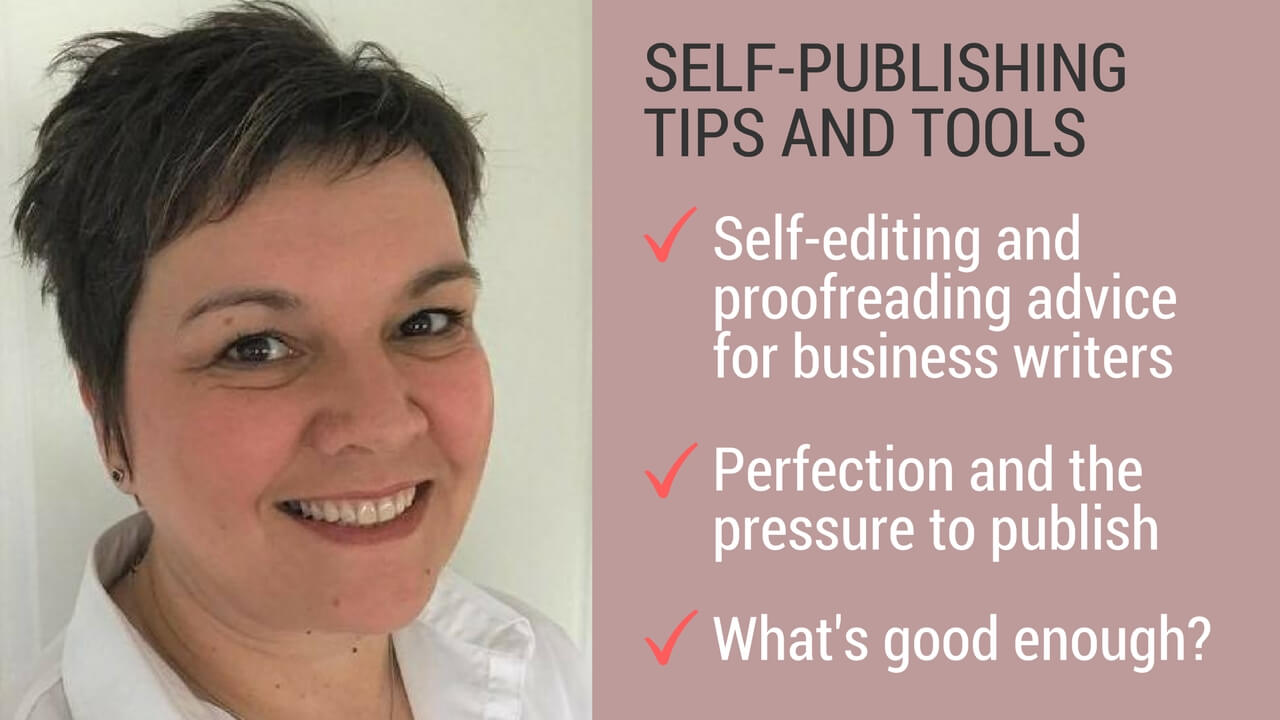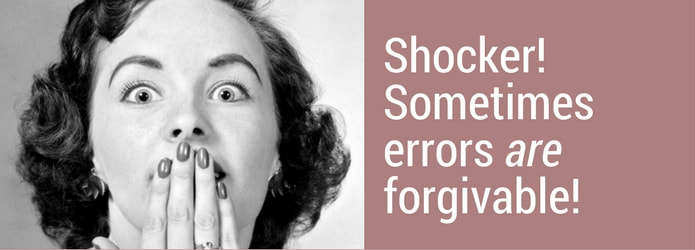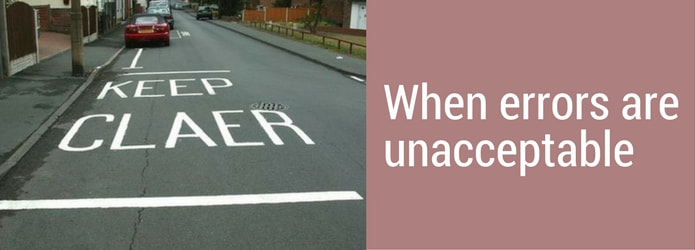|
My friend and colleague Denise Cowle is a specialist non-fiction editor who works with a wide range of businesses, so she understands the pressure to publish better than most. Here's her expert advice on when good enough is acceptable ... and when it's not.
Perfection and the pressure to publish
When you write for your business, is it perfect? Should it be? Small businesses without the benefit of a dedicated marketing department are increasingly recognizing the power that quality content has to raise their profile, connect with their potential clients and ultimately drive sales. However, the focus on publishing content regularly can pile on the pressure to get something – anything – out there, to keep up with the publishing schedule for your blog, or to update your web copy and marketing materials to reflect the latest developments in your field. Does this writing have to be perfect? Should we expect everything that people produce to be error-free? If you pay too much attention to the Grammar Police, you’ll be paralysed with fear that a misplaced apostrophe or misused word will bring your carefully constructed business crashing down around your ears. There’s no excuse for poor grammar, they’ll bellow, caps lock on, from behind the anonymity of their screens. Ignorance of correct spelling is the scourge of society, they’ll mutter, labelling you as feckless, careless and lazy, without knowing anything about you or your business, other than the fact you typed except instead of accept. But as an editor, and advocate of content marketing, I beg to differ. I think there are occasions when it’s OK to put out content with errors. Shock! I know! Am I doing myself out of a job here? Not exactly.
This is not permission to abandon all standards
Before you go rushing off to dispense with the services of your freelance editor and disable spellchecker, let me explain. I’m not for a minute suggesting that you should take this as permission to abandon all efforts to produce great, error-free copy. I’m working on the assumption here that you’ve taken time to make your copy the best it can possibly be within your time and budgetary constraints. I’m assuming you’ve used the tools and techniques available to you; you’ve run the inbuilt spellchecker or other software, read through your text carefully, and used a dictionary when you’ve been unsure. But sometimes, despite all your efforts, errors remain, either because you’ve missed them or because you don’t actually recognize them as errors in the first place. You go ahead and hit the publish button, and your mistakes are out there for all the world to see. We’ve all done it, but it’s rarely the end of the world. When is it OK to publish content with errors? In my view, it’s forgivable to have the odd mistake in content that:
It comes down to the purpose of the content, the medium you’re using, and the value your audience places on it. Your reputation will survive a typo in a tweet signposting your latest blog (I’ve done it myself and lived to tell the tale). Unless, of course, the typo is so unintentionally funny or rude that it goes viral! And even then, is there such a thing as bad publicity? It depends on your business, and what the error is. If you’ve created a free email course as lead generation I’d expect it to be error-free. However, the odd missing apostrophe or spelling mistake may not be a deal-breaker for your audience if the content is amazing and provides lots of value.
When is it not OK to publish content with errors?
It’s not OK to publish content with any errors if:
If you’re an editor or proofreader, to my mind this is a no-brainer. Your clients are looking for perfection, or as near as dammit. There is no margin for error here. And don’t think you can get away with proofreading your own writing because, let me say this clearly: You. Will. Miss. Things. Who wants to hire an editor with spelling or grammatical errors in their copy? The answer should be: no one.
Banish procrastination and publish!
No one wants to see any writing, however fabulous the content, strewn with spelling mistakes and grammatical blunders. But I’d much rather see you sharing your content with the world than keeping it in a draft folder because you’re worried that it might contain errors. Don’t allow fear to prevent you from publishing. Do your due diligence – run spellchecker, follow my tips on how to proofread your own writing – and get it out there! The world doesn’t stop turning because of a couple of typos, and you owe it to yourself and your business to write that copy, making it as good as you can. Should you hire someone to edit/proofread blog posts or other content? Rather than slogging over copy like it’s your overdue English homework, you might recognize that your time is better spent elsewhere and free yourself from the burden. If writing isn’t an enjoyable part of your work, wouldn’t it be better to outsource all or part of the process? Giving yourself permission to do this acknowledges that your time is a commodity in your business, and you have a responsibility to spend it wisely. You should consider this option when:
Is good enough, enough? Not everyone is blessed with the ability to write well and consistently, but I believe that everyone can improve with practice. Learning from mistakes is a crucial part of the process, and that can only happen when you write your web copy or publish your blog and allow other people to read it. Good enough can be enough when it’s on the road to even better.
Denise Cowle is a copy-editor and proofreader for non-fiction. She works with educational materials, reports, marketing copy and blogs. Her blog focuses on helping you to be a better non-fiction writer. Denise is an Advanced Professional Member of the Society for Editors and Proofreaders.
Further reading from Denise
Louise Harnby is a fiction copyeditor and proofreader. She curates The Proofreader's Parlour and is the author of several books on business planning and marketing for editors and proofreaders.
Visit her business website at Louise Harnby | Proofreader & Copyeditor, say hello on Twitter at @LouiseHarnby, or connect via Facebook and LinkedIn. If you're an author, you might like to visit Louise’s Writing Library to access my latest self-publishing resources, all of which are free and available instantly.
3 Comments
14/9/2017 09:30:39 am
I agree completely, Denise. Sadly, so completely that I'm sharing your post with a client who's decided not to continue having his blog edited for now – to save money – because in this case, I agree with him and want to support him. I know that when he has "bigger" or more visible projects, though, he'll be in contact. Thanks for this.
Reply
Richard Adin
14/9/2017 06:54:44 pm
Excellent article but (I know, Louise, it seems I always have a but) one more point needs to be made. Leaving an error is never acceptable if it means that a reader may misunderstand the point the author intends to make, especially if it allows the reader to conclude the opposite. Although we all make errors, some errors are never acceptable.
Reply
6/10/2020 02:12:09 am
I feel there is definitely a lot of criticism over typos and general mistakes, but I also wanted to say, as a writer and prolific reader, I have seen very well know authors, whose books have been published by some of the top publishing houses, and they have still had mistakes.
Reply
Your comment will be posted after it is approved.
Leave a Reply. |
BLOG ALERTSIf you'd like me to email you when a new blog post is available, sign up for blog alerts!
TESTIMONIALSDare Rogers'Louise uses her expertise to hone a story until it's razor sharp, while still allowing the author’s voice to remain dominant.'Jeff Carson'I wholeheartedly recommend her services ... Just don’t hire her when I need her.'J B Turner'Sincere thanks for a beautiful and elegant piece of work. First class.'Ayshe Gemedzhy'What makes her stand out and shine is her ability to immerse herself in your story.'Salt Publishing'A million thanks – your mark-up is perfect, as always.'CATEGORIES
All
ARCHIVES
July 2024
|
|
|
|



















 RSS Feed
RSS Feed





